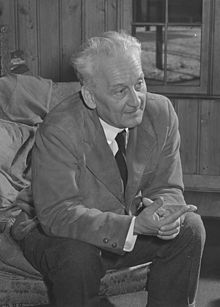Albert Szent-Györgyi
| Albert Szent-Györgyi | |
|---|---|

Albert Szent-Györgyi at the time of his
appointment to the National Institutes of Health |
|
| Born |
September 16, 1893 Budapest, Austria-Hungary |
| Died | October 22, 1986 (aged 93) Woods Hole, Massachusetts, United States |
| Residence | Austria-Hungary United States |
| Citizenship |
Austro-Hungarian American |
| Fields |
Physiology Biochemistry |
| Institutions |
University of Szeged University of Cambridge |
| Alma mater |
Semmelweis University, MD University of Cambridge, PhD |
| Doctoral advisor | Frederick Gowland Hopkins |
| Known for | vitamin C, discovering the components and reactions of the citric acid cycle |
| Influences |
Frederick Gowland |
| Notable awards |
Nobel Prize in Physiology or Medicine (1937) Albert Lasker Award for Basic Medical Research (1954) |
| Spouse |
|
| Signature | |
Albert Szent-Györgyi von Nagyrápolt (/sɛntˈdʒɔːrdʒi/; Hungarian: nagyrápolti Szent-Györgyi Albert, pronounced [ˈnɒɟraːpolti ˈsɛnɟørɟi ˈɒlbɛrt]; September 16, 1893 – October 22, 1986) was a Hungarian American physiologist who won the Nobel Prize in Physiology or Medicine in 1937. He is credited with discovering vitamin C and the components and reactions of the citric acid cycle. He was also active in the Hungarian Resistance during World War II and entered Hungarian politics after the war.
Szent-Györgyi was born in Budapest, Kingdom of Hungary, Austro-Hungarian Empire, in 1893. His father, Miklós Szent-Györgyi, was a landowner, born in Marosvásárhely, Transylvania (today Târgu Mureş, Romania), a Calvinist, and could trace his ancestry back to 1608 when Sámuel, a Calvinist predicant, was ennobled. At the time of Szent-Györgyi's birth, being of the nobility was considered important and created opportunities that otherwise were not available. (Miklós Szent-Györgyi's parents were Imre Szent-Györgyi and Mária Csiky). His mother, Jozefina, a Roman Catholic, was a daughter of József Lenhossék and Anna Bossányi. Jozefina was a sister of Mihály Lenhossék; both of these men were Professors of Anatomy at the Eötvös Loránd University. His family included three generations of scientists. Music was important in the Lenhossék family. His mother Jozefina prepared to become an opera singer and auditioned for Gustav Mahler, then a conductor at the Budapest Opera. He advised her to marry instead, since her voice was not enough. Albert himself was good at the piano, while his brother Pál became a professional violinist.
...
Wikipedia

